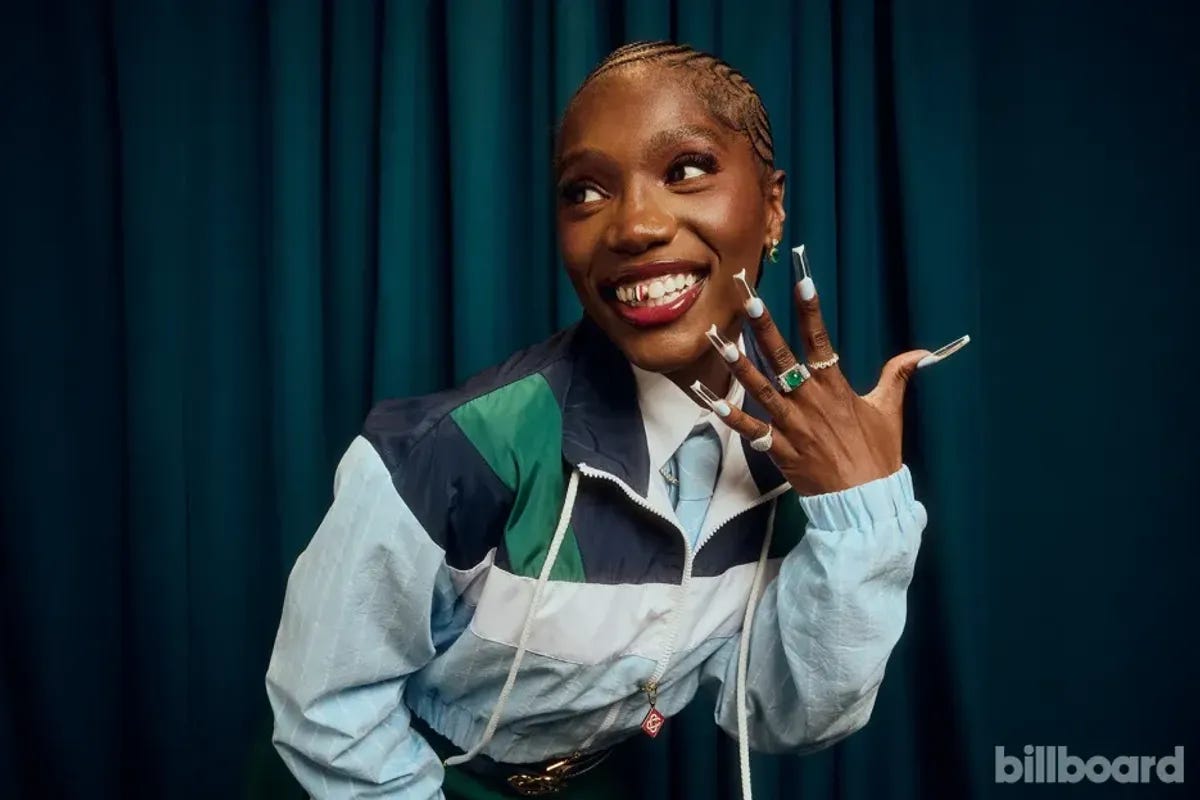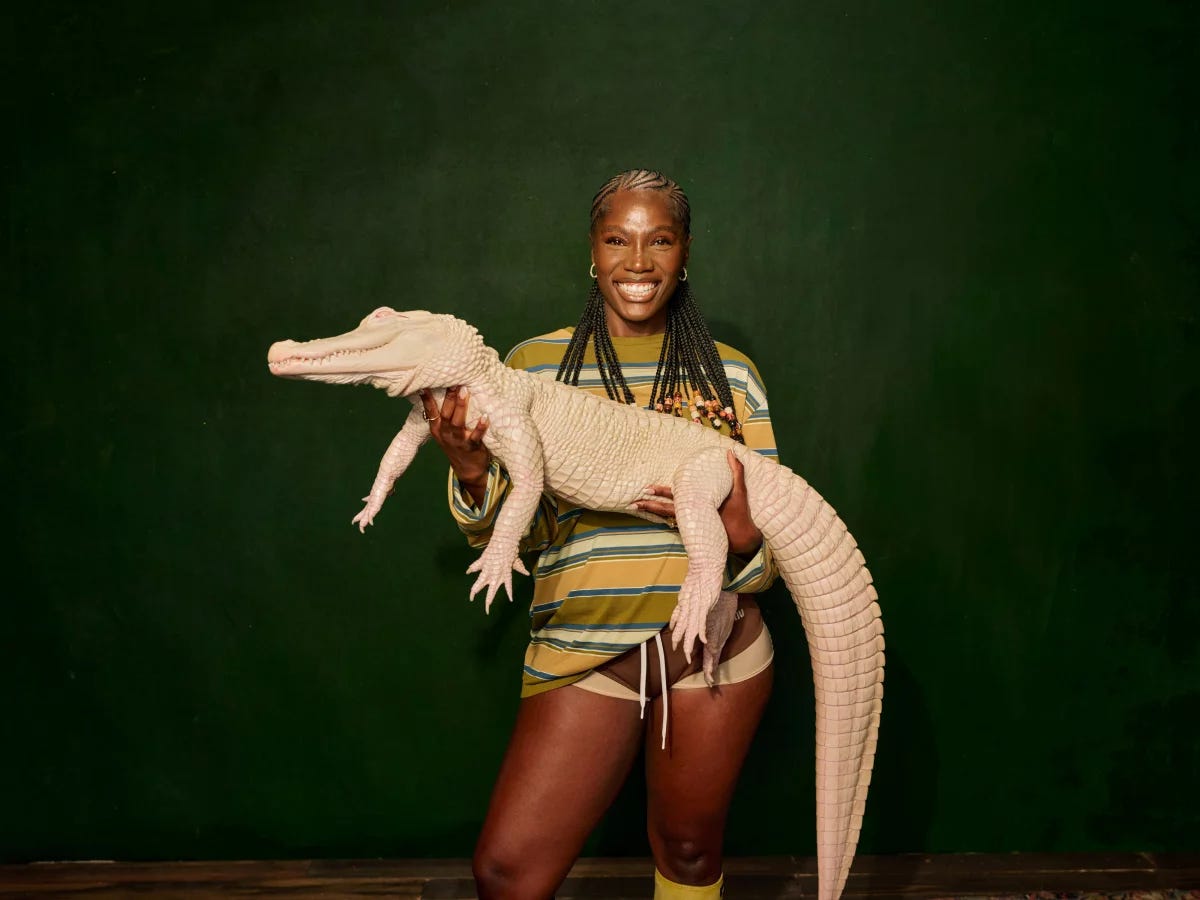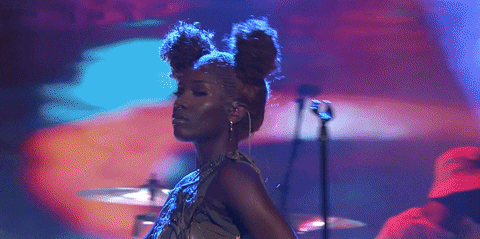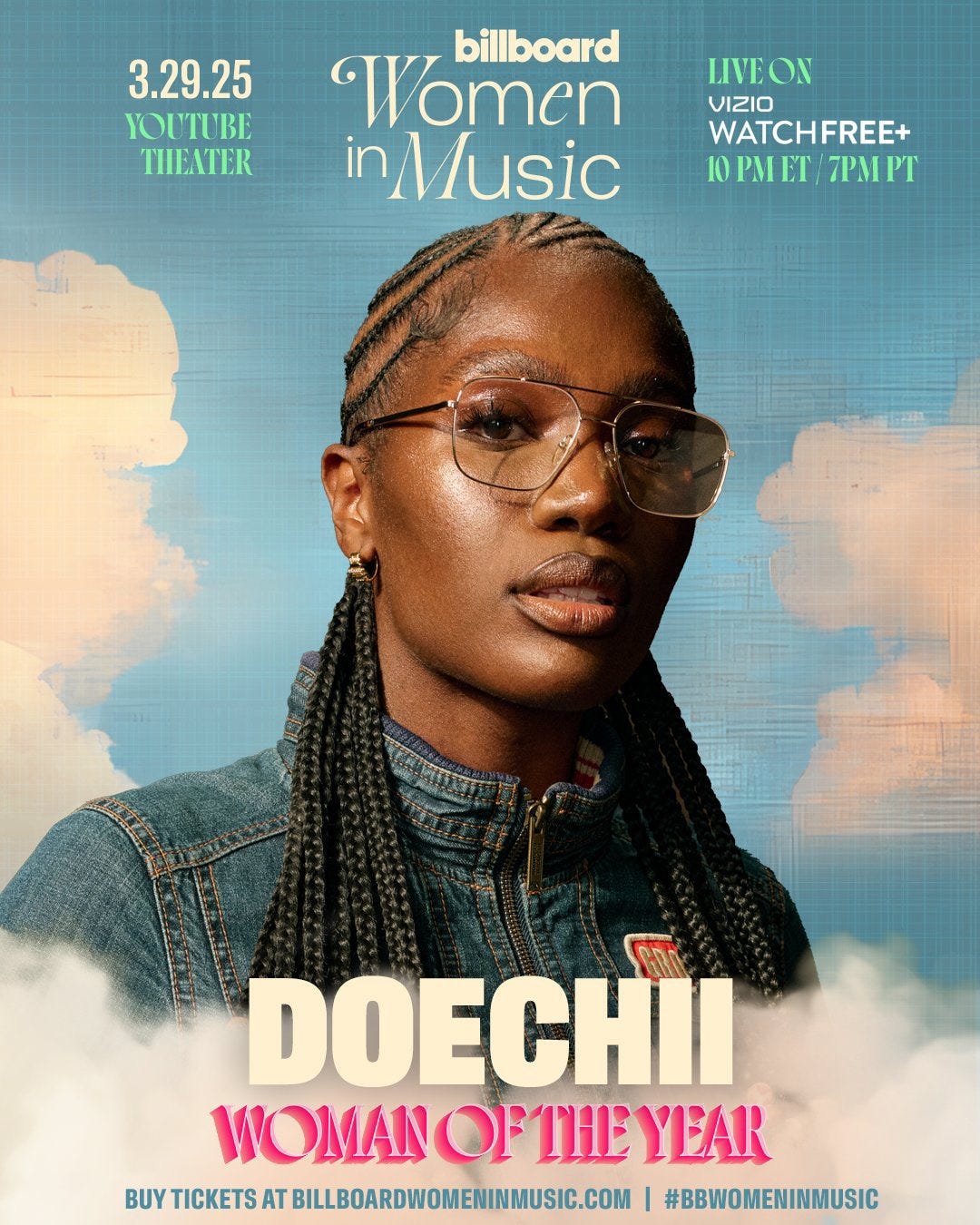What's REALLY the Problem With Doechii?
Industry Plant or Just Black Excellence Making You Nervous?
Look, I’ll be real with y’all. Until about last year, I couldn’t have picked Doechii out of a lineup if my life depended on it. Just saying. I was clueless. My first real exposure to her was through the Joe Budden Podcast (shoutout to Joe—I stay tuned in), and they had her on as a guest. I remember clearly because she caught my attention instantly. She was calm, well-spoken, incredibly charming—almost like a homegirl or a cool big sister. Great vibes all around. But when it came down to the actual music part of her appearance—the reason she was there—I realized I hadn't heard a single note of hers. I didn't know "What It Is," had never heard of an "Alligator Bite" that never heals (sounds painful?), and definitely hadn't danced to any "Yucky Blucky Fruitcake." However, I did read that Junie B. Jones book as a kid. Don’t judge me, Junie B. Jones was turnt. "My name is Junie B. Jones. The B stands for Beatrice. Except I don't like Beatrice. I just like B and that's all." Y'all remember! That always reminds me of my great grandma, Daisy B. Rest in peace. But anyway, I’m getting off track!
So full transparency: to this day, I still haven't properly sat down and absorbed her album or gone back to study her previous works. Sure, I’ve caught clips floating around X and TikTok, snippets of videos and brief performances, but nothing ever sparked that I-need-this-in-my-rotation-right-now fire for me personally. And that's cool—not everything has to be my thing. Music taste is subjective, and I can appreciate someone without being their number-one fan. It's all love.
Yet, despite my personal ambivalence toward actually bumping her music in the whip, I found myself constantly surrounded by Doechii’s name. It was everywhere, unavoidable, like Instagram ads popping up after you whispered “air fryer” once near your phone. It was kind of wild—overnight, the girl went from obscure (at least to me) to omnipresent. From Twitter timelines, TikTok FYPs, Grammy announcements, to industry blogs and award show performances, she was suddenly unavoidable. And naturally, because this is hip-hop, this rapid ascent didn’t go unquestioned. Pretty soon, whispers began creeping in: “Industry plant.”
Ah, yes—the infamous phrase every new artist dreads. "Industry plant," a term thrown around so liberally these days it’s almost lost its original meaning. For those who might not be up on the lingo (mom, if you're reading), an industry plant refers to an artist whose rise is artificially manufactured or boosted by label backing, streaming manipulation, paid promotion, or a secret Illuminati-like industry cabal. You know, casual stuff.
The Doechii accusations popped up immediately following her meteoric rise post-signing to Top Dawg Entertainment (TDE)—home to heavyweight lyricists like Kendrick Lamar and SZA. It’s funny how once a credible label picks someone up, people act like said artist had zero grind beforehand. Let’s take a quick look back at Doechii’s timeline for clarity:
Jaylah Ji'mya Hickmon (Doechii’s government name, because we love specifics) popped off initially with the TikTok hit “Yucky Blucky Fruitcake” around 2020–2021. It blew up big-time, and soon after, TDE came knocking. Since then, she’s had legit milestones—a Billboard chart entry with Kodak Black ("What It Is"), a mixtape ("Alligator Bites Never Heal") peaking at #14 on the Billboard 200, and eventually, that controversial Grammy win for Best Rap Album in 2025.
Now, let’s pause right there—because I have to keep it all the way real here. That Grammy was wild. Her mixtape sold only 11,000 first-week units. Eleven thousand. Now, I get it; numbers aren't everything, and sales don't always reflect artistry or cultural impact. But when you're taking home a Grammy—a whole Grammy—for numbers like that, eyebrows will inevitably arch sky-high. Especially when you’re going toe-to-toe with industry heavyweights. I mean, Em was right there in the category. Eminem! You see why the suspicion starts creeping in, right? I mean, that album was good, I listened to it, once. I should probably spin it again too… (I probably won’t).
And another thing, let's clear something up right quick. I know those 11k first-week sales had y’all scratching your heads, but this is the thing—the Grammy’s aren't Billboard Awards. They aren't handing out trophies based purely on who moved the most units. The Grammy committee judges artistic merit, critical acclaim, creativity—all the subjective stuff. Low sales don't disqualify you; sometimes they even enhance the credibility of the win. It means the academy actually listened to the music and didn't just glance at the streaming numbers. Plus, let’s remember—this was before the DEI dismantling, so diversity was still trending.
At any rate—here's my actual question—so what? Let's say, for argument's sake, she is an industry plant. Does that erase her talent, or does it invalidate the cultural significance of having a Black woman, openly queer and confidently creative, succeed at this level? Aren't we supposed to be championing Black excellence out here? Why is it when one of our own starts skyrocketing, we instantly look for ways to pull them back down to Earth?
Doechii clearly has talent. Watch any of her live performances—her BET wig-snatching extravaganza or her NPR Tiny Desk concert—and tell me she doesn't have it. She’s charismatic, energetic, visually creative, vocally solid, and lyrically competent. She checks boxes. So why are we mad at her getting a little industry love, assuming that's what happened?
Let's not act brand-new here: every single star you've idolized had industry backing at some point. Beyoncé wasn't just singing into her bedroom mirror for 15 years waiting for someone to accidentally discover her. Labels, management, styling, PR teams, features—these are not dirty secrets. They're the music industry’s backbone. You think Drake organically landed on your playlist for the past 15 years without massive industry support? Don’t be naïve. It's called the music business for a reason.
But there’s a catch here—a cultural catch. Hip-hop is obsessed with authenticity. We want our artists to have "real" stories. We romanticize the grind, the struggle, the underground come-up. Anything hinting at manufactured fame triggers alarm bells. It feels disingenuous, as if success without struggle isn't valid. Yet we conveniently ignore how selective we are about who we label an "industry plant." Why Doechii? Why not Jack Harlow? Why not Post Malone? (Well, maybe him too, but that's another newsletter entirely.)
Here’s another layer worth noting—misogyny and internalized anti-Blackness in hip-hop culture. Let's face it: a young, openly queer, dark-skinned Black woman ascending this quickly makes some folks uncomfortable. Suddenly, we're ready to believe labels engineered this success because surely, she couldn’t just be talented and marketable, right? Yet, no one throws these accusations around when lighter-skinned or non-Black artists catapult similarly. Make it make sense.
Doechii herself addressed these claims in typical fashion—confidently dismissing haters as "stupid as hell," which I honestly loved. Her retort basically boiled down to, "If they're talking, I'm doing something right," and she’s correct. No one bothers accusing an irrelevant artist of being a plant. Attention is attention, controversy sells, and Doechii knows it.
This leaves us with a tricky scenario. Yes, the Grammy situation remains eyebrow-raising, and yes, rapid growth inevitably invites scrutiny. But we can't discount that Doechii put in years of work before catching a major break. It’s not like she went viral one Tuesday and won a Grammy the next Friday. There’s a middle ground between complete organic obscurity and absolute label fabrication. That middle ground is likely where she comfortably resides.
A "Straight Man" Walks Into a Controversy
Alright so check it out, I could not write this without addressing the latest controversy right? Doechii’s mouthpiece alone could start a fire. And that’s exactly what happened when she pulled up to Hot Ones Versus. When they asked her about her biggest dating red flag, she hit ‘em with: 'A straight man.' Now, if you listened closely, you could hear Black Twitter collectively screeching to a halt. Because if there’s one thing that’ll send certain corners of the internet into a tailspin, it’s a Black woman openly dismissing Black men like that. So I want to take this section to give some more context and analyze why people, mainly brothas, were upset.
Doechii didn’t just say “a man,” she said a straight man—which, in today’s hyper-online climate, is basically throwing a Molotov cocktail into discourse. Her DJ, Miss Milan, even laughed and admitted she was about to say "men" in general. Now, some people chuckled and moved on—it’s not like women haven’t been openly clowning men in dating convos for years. But for a lot of Black men, this hit a nerve.
Why? Because there's already a running narrative that Black women in entertainment don’t "respect" Black men anymore, that successful women in the industry are quick to write them off, or that queer women in rap seem especially dismissive of straight Black men. Is that fair? Depends on who you ask. But perception is reality, and Doechii just added another bullet point to the argument that mainstream rap’s new wave of women don’t need or care about straight Black men.
And truth be told—if a male rapper got on a mic and said, "Biggest red flag? A Black woman." Oh, it would’ve been a funeral. Immediate cancellation. Thinkpieces. Instagram live rants. But when it's the other way around? A lot of people shrug. That’s the double standard, and while I’m not arguing for “equal opportunity disrespect,” it’s worth pointing out.
The Backlash: Real or Overblown?
Predictably, social media did its thing. X was divided between:
"She’s joking, y’all need to relax."
"Nah, see this is exactly why men are checking out of relationships with modern women."
"If a man said this about women, it’d be a wrap."
"Black men are so fragile, she ain't even lying."
“She’s ugly anyway.”
You had the usual suspects chiming in—the passport bros trying to use this as Exhibit A for why they’re fleeing the country, the "Black women hate Black men" conspiracy theorists, and the pick-me patrol on TikTok saying, "Well, she ain’t wrong!" It was the perfect storm of outrage bait.
Doechii’s Brand: Unfiltered and Unbothered
The thing is—I don’t think she cares. She’s the kind of artist who thrives off of not fitting into a box. She’s not aiming for “relatable good girl” branding. She’s loud, chaotic, expressive, experimental, and, most importantly, she stands by what she says. So while some people are calling her problematic, others love her for it. They see her as one of the few mainstream women in rap who isn’t playing it safe. I promise you that’s going to keep her in the game longer.
And honestly, if you’ve been paying attention, this is exactly the type of response she’d give. It’s in line with everything else about her—pushing buttons, leaning into controversy, and letting people argue about her while she keeps collecting checks.
At the end of the day, what's REALLY the problem with Doechii? Is it jealousy? Is it internal gatekeeping? Is it genuine skepticism toward major labels and their influence? Or is it a weirdly ingrained impulse within hip-hop culture to question the legitimacy of female, queer, and especially dark-skinned artists’ successes?
Perhaps it's a messy cocktail of all those things. One thing’s certain: The moment Doechii became unavoidable, her identity as a success story became controversial. But controversial or not, industry push or organic talent, the truth is she's undeniably making waves. And honestly, if I'm Doechii, I'm not losing sleep over any of this. I’m polishing my Grammy, counting my streaming checks, and letting Twitter (or X, or whatever we’re calling it today) do its thing. Because in hip-hop, love it or hate it, chatter equals clout.
So to those still obsessing over Doechii’s supposed industry-plant origins, I leave you with this: Maybe chill. Take a breath, appreciate the hustle, celebrate Black excellence where we find it, and remember—nobody called your fave rapper a plant when they got their big break.
Or did they?
Guess we’ll talk about it in the next newsletter.







“an industry plant refers to an artist whose rise is artificially manufactured or boosted by label backing, streaming manipulation, paid promotion, or a secret Illuminati-like industry cabal. You know, casual stuff.”
Not casual stuff 😂😂😂 honestly, people just hate Doe because they can. This is my opinion, but the red flag thing made me look at her weird, but I’m also peeping the game she’s lowkey playing so 🤷🏽♀️ her album slaps!!